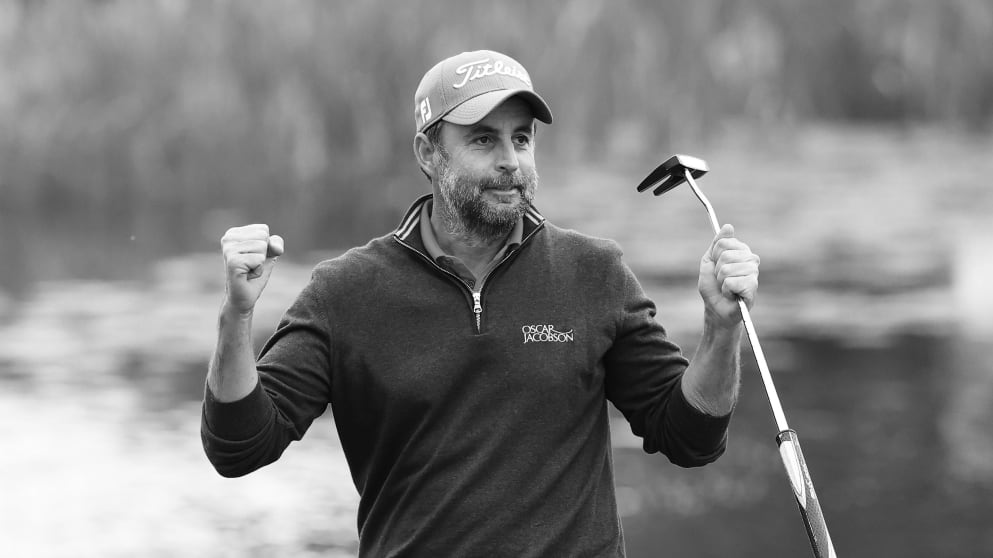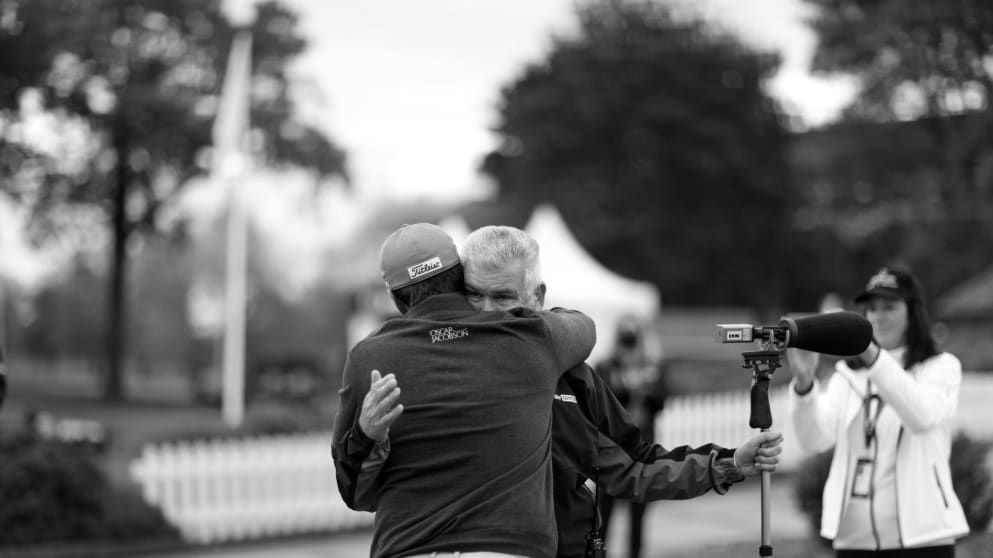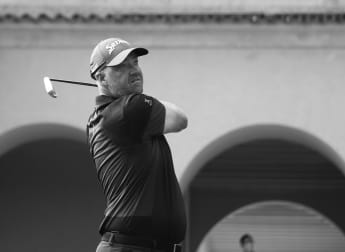In this week’s Player Blog presented by Enterprise Rent-A-Car, Richard Bland reflects on the ups and downs of professional golf, and breaking through for his first win.


It feels like the reality of winning has finally sunk in now, and the main feeling I have is just one of satisfaction. A lot people have asked over the last seven days how I’ve felt, and it was a pretty big whirlwind the first two or three days with all the media and social attention. It was very overwhelming. It’s funny though, because I think if I’d won earlier in my career the elation I had of winning on Saturday would have stayed with me longer, but having achieved it so late in my career, I just feel more satisfaction, and relief, that I’ve finally got that first win.
I always knew that to win any golf tournament would be tough and that I’d have to work. Even after I won on the Challenge Tour twenty years ago, then came close during my rookie year on Tour in a play-off in Ireland, I was never under any illusion that winning was going to be a breeze. The standard is just so high, and even 19 years ago I was still playing against the best players in Europe, and sometimes the world. Now, it’s not that winning has become any more difficult, but it feels like everyone has a chance. I honestly think anyone teeing up at the British Masters was good enough to win, and that’s just the standard that’s out here.
But when you’ve been out here as long as I have, you do start to wonder ‘when is it going to be my week?’, and question ‘is it ever going to happen?’. I’m sure someone like David Drysdale feels the same, and he’s had a couple of near misses and been desperately unlucky in places like Qatar. But when you put it in perspective, every week there are 155 losers in golf. The only thing you can do is believe in yourself, and as long as you feel like you are working hard, you hope that door is going to open one week.
Completely overwhelmed by the messages I’ve received. From friends & from people I’ve never met that watched & have followed my career. Way to many to reply to individually. So please all of you accept this as my reply & the biggest thank you ever from the bottom of my heart ❤️
— Richard Bland (@blandy73) May 17, 2021
There are so many highs and lows in golf, and when I lost my card at the back end of 2018, going back to the Challenge Tour was a hard thing to get my head around. In the end though, it wasn’t a tough decision. I was 46, and I said to my coach Tim Barter what am I going to do the next three or four years. I realised that one poor year doesn’t make you a bad player. It was definitely a low point, but I always had that belief that I could still compete, and win, on the European Tour. I would never, ever put what happened to my brother as the excuse for losing my card, but I wasn’t at the races for the first six months of that year. He was the priority, and rightly so, because his health would always be more important than whatever I achieved in golf. But the standard of play now is so high that you can’t be absent for that amount of time mentally and expect to compete. Even the top players you’ve seen it with, if they aren’t there mentally they will struggle to win too.
But I was determined to have another go at it, and that’s when Tim and I really changed the focus of my practice to 140-150 yards and in. I had experience, but on Challenge Tour courses you can’t win your card back on length alone, and I knew that’s how I could improve my scoring average. It’s what I work on now 80% of the time, and whenever Tim is with me he’ll call out random numbers and if I’m more than 2 yards out it’s not good enough. I also have a red book in my golf bag where I log stock distances for different temperatures depending on where we play. We’re just constantly refining things, and to have a coach I’ve been with for so long and feel comfortable with is really important for me. We haven’t worked on any big changes for quite a number of years except maintaining and refining so I can have a mindset of just hitting the shot, and that’s where I was at the Belfry. Fortunately that door finally opened, and it was something I’ll remember for the rest of my life.
Many people would've quit.
— The European Tour (@EuropeanTour) May 17, 2021
But the age of 46 Richard Bland went back to the @Challenge_Tour and kept on believing in himself 👊 pic.twitter.com/R7uPwt9FO8
I think the main difference for me that week was that I’d managed to get some time at home. My game was in pretty good shape, I’d played well in Sunday and Tenerife and knew the only thing I’d need to get a feel for was the pace of the greens. But I’d played four weeks straight and I’ve always been someone that will try to get home if we’re in Europe, so just to have that time 24 hours in that home environment before going to The Belfry on Tuesday was big.
Otherwise, there were a couple of other things that were slightly different that had a small impact. I got a text from Howeller (David Howell) about him having a dream earlier in the week that I was going to win, but one thing was that Tim text me on Saturday morning. He’s never done that before when I’ve been in contention, and he said: ’69 isn’t going to do it, you have to shoot 66 to win this.’
The night before he’d told me I needed to be more aggressive with my putting, and while I didn’t think I was hitting bad putts, I knew I hadn’t holed my fair share on Friday. So I took that away, because putting is probably the only thing we ever argue about now, and that morning I just had a small shift in mentality. Throughout the day I was more conscious about giving it an extra 10%, and he was right. Having said that, that first putt on 18 on Sunday was much more of a feel putt, which is how I like it, rather than a Tim-style putt, so I was comfortable about the pace and line.

Brendan my caddie was a great help in those circumstances. When I holed that putt on the 18th green it was such a big moment, but he really stepped in and was great. He immediately came over and said ‘let’s not get carried away, let’s stay focused and calm because there are still six or seven guys out there that can get to 13 and you might need to play more holes’. I didn’t say anything, but I was saying to myself ‘okay, go to the range, stay loose’, and then extra holes were needed.
Even when we got to the ball on the play-off hole and saw the lie was not great, he told me not to fiddle around or try and manufacture a shot, just hit it and we’ll deal with it. I remember thinking ‘Oh god, not now’ when we were approaching it and couldn’t see all of the ball, and we had no option other than to go with the five wood because there was grass behind the ball. He told me to just keep it dry and we’ll have a chance to make four, and it came out great and fairly straight.
When I stood over that final putt, I’m not going to say I wasn’t nervous, but I was so much calmer than I thought I would be. You wouldn’t be human if you didn’t think ‘this putt is to win’, and when Guido missed I did have that mentality for a split second. But when I got to the ball, I tried to get back into that ‘this is just one shot’ mentality, and the nerves just left me. I always thought I’d be shaking like a leaf, but I just felt calm. And that thought process allowed me to hole the putt, and it’s only after everything pours out of you because you’ve achieved the thing you’ve always wanted.
When I saw Tim, who has been with me for my entire journey, for that interview afterwards, and then seeing my parents, I was trying hard not to lose it. I owe my parents everything, and that win was really for my whole family, my sister and brother – who is better now - and the many people who have helped along the journey.
It was nice to have Oli Wilson in the car on the way home because he was able to talk me through what’s going to happen. We had a bit of a laugh, and then he said there’s no tournament next week, your whole family is celebrating, go and celebrate with them and really enjoy it because this is your chance to. I phoned my sister, drove to Southampton and surprised everyone else. I picked my girlfriend up and was there about 4 hours after my win, and it was incredible very special.
Bland's celebration plans sound crazy 😂#BetfredBritishMasters pic.twitter.com/W08EI1JAo0
— The European Tour (@EuropeanTour) May 15, 2021
Having that two year exemption is almost, almost bigger than winning the tournament in some respects. My plan before that was just to go to PGA TOUR Champions qualifying at the end of next year, and it’s an unbelievable position for me to be in now to have more than one option. I’m very grateful for that and being able to pick and choose where I want to play. I also have the U.S. Open to look forward to at Torrey Pines, and getting to play such an iconic venue after also playing at Bethpage in 2009 is going to be very special.
But one of the biggest things is that I will definitely get to 500 tournaments, which will be a hugely proud moment, because it means I’ve had a proper career on the European Tour. It’s not something that everyone will achieve. It’s been amazing to watch us older guys have success in the last year, from Lee Westwood to Phil Mickelson last week. They are guys whose careers have stood the test of time, but the game has changed a lot. With how much these younger guys put their bodies through, in ten-15 years’ time I don’t think you’ll see many playing 400-500 events. You look at a lot of the top players who are injured now because they push themselves hard, and I’m not sure that will withstand a career that like ours has been focused on longevity. But maybe that’s a change in the mentality now, that it’s better to have a ten-12-year career where you peak the entire time.
When I hang everything up, if I don’t win another tournament, reaching 500 appearances will sit right alongside the British Masters. That’s a 25-year career, and that is something I’ll be very, very proud of.







